Unit 2 词汇与知识点精讲(2024-2025学年人教八上英语Unit 2 How often do you exercise?)
文档属性
| 名称 | Unit 2 词汇与知识点精讲(2024-2025学年人教八上英语Unit 2 How often do you exercise?) |  | |
| 格式 | pptx | ||
| 文件大小 | 29.9MB | ||
| 资源类型 | 试卷 | ||
| 版本资源 | 人教新目标(Go for it)版 | ||
| 科目 | 英语 | ||
| 更新时间 | 2024-09-06 12:37:32 | ||
图片预览


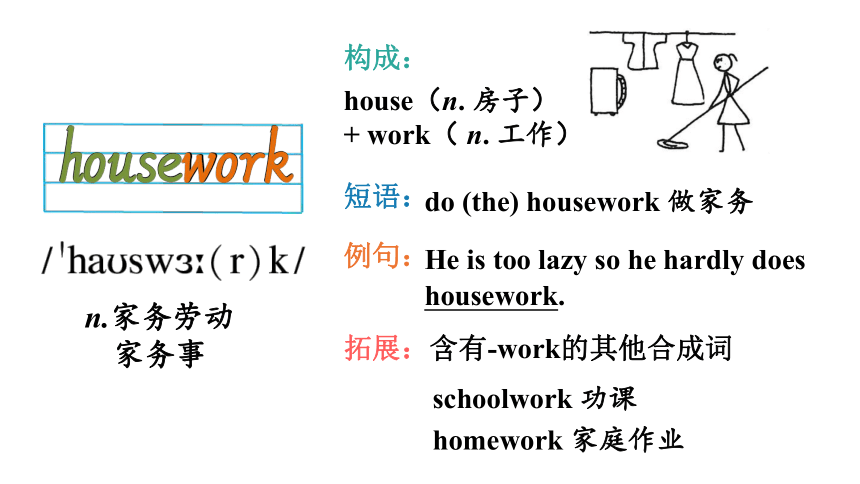
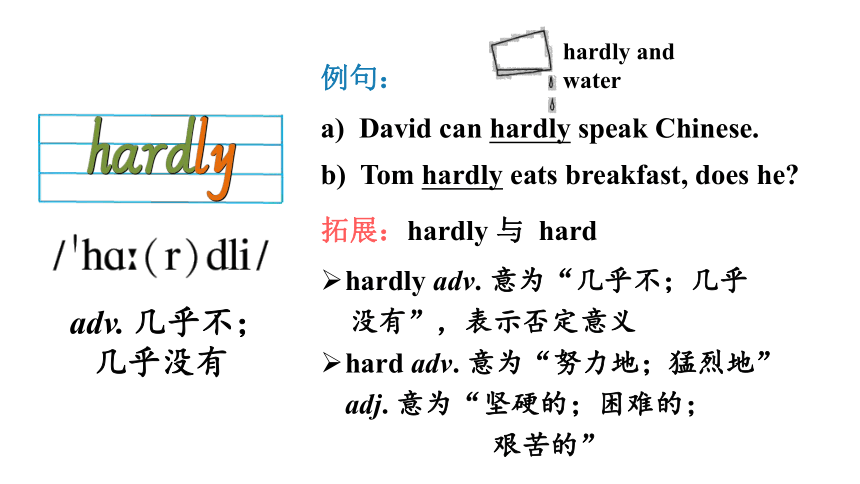
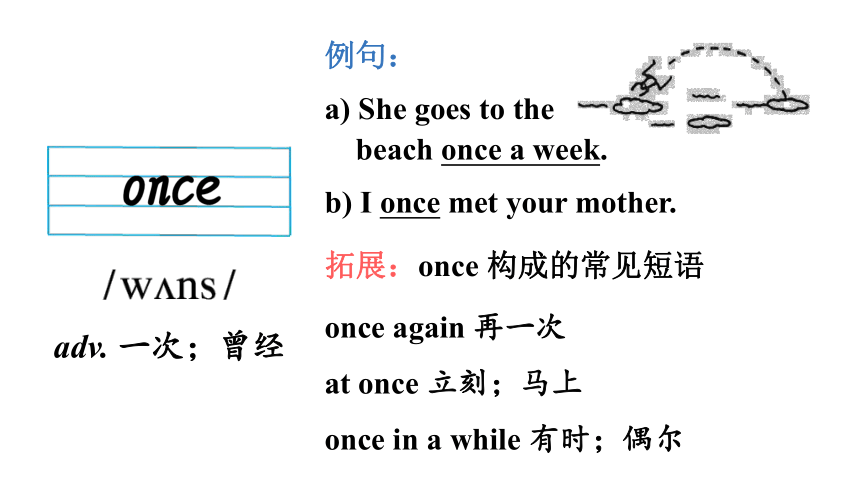
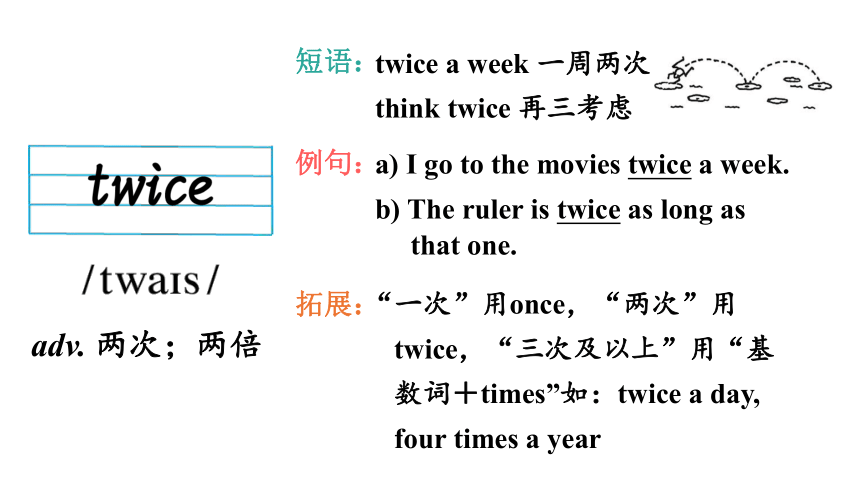
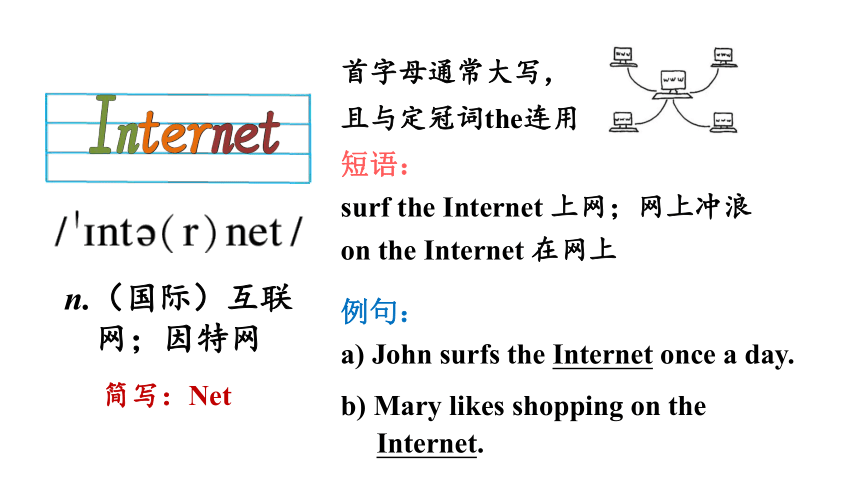
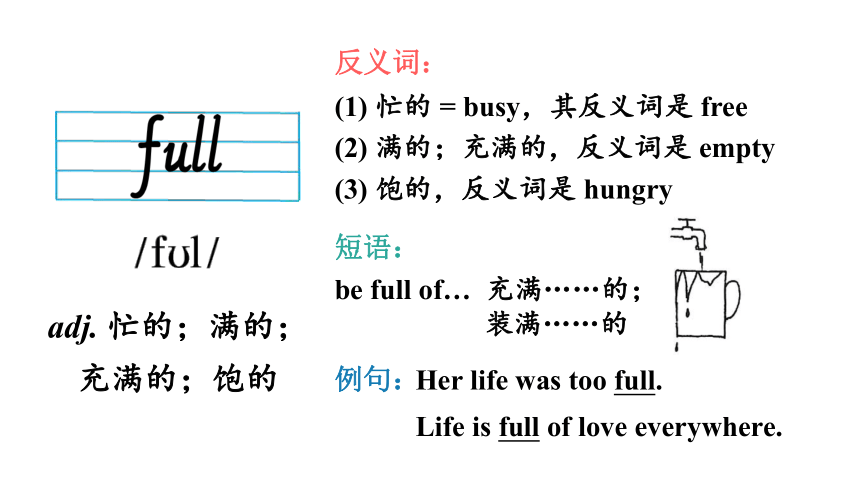
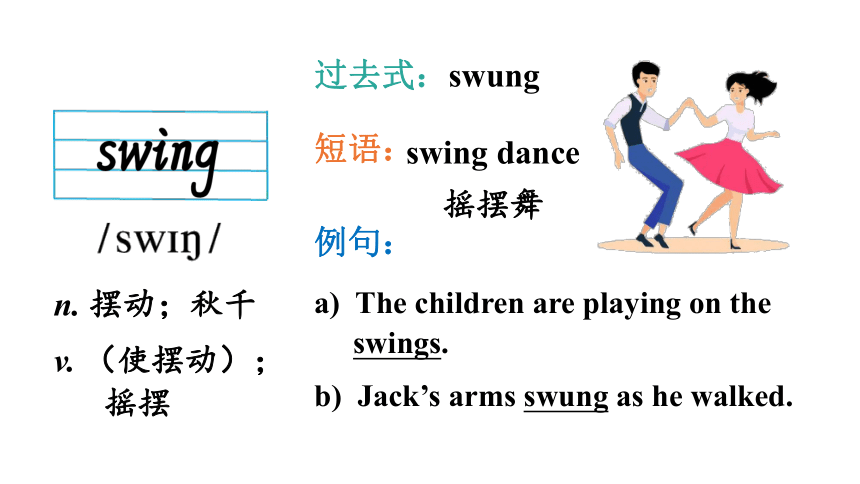
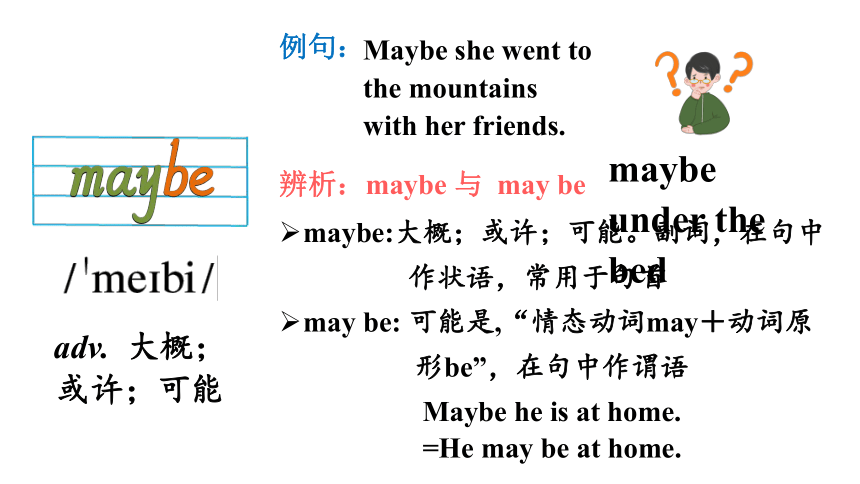
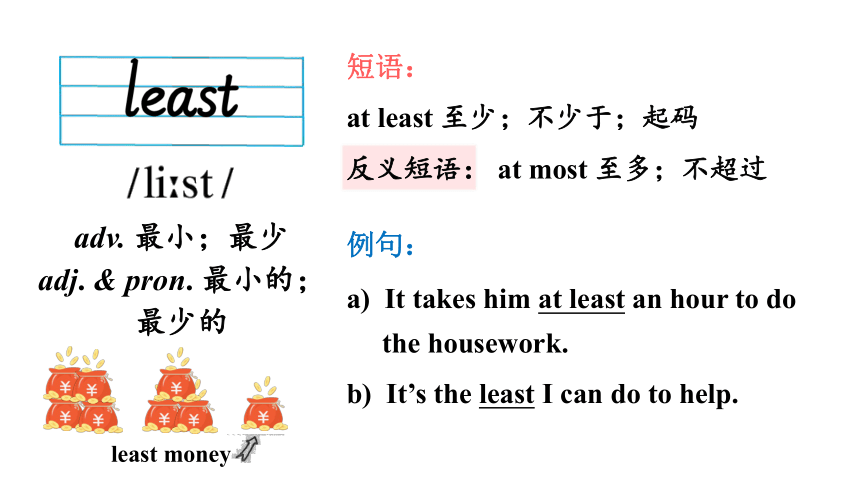
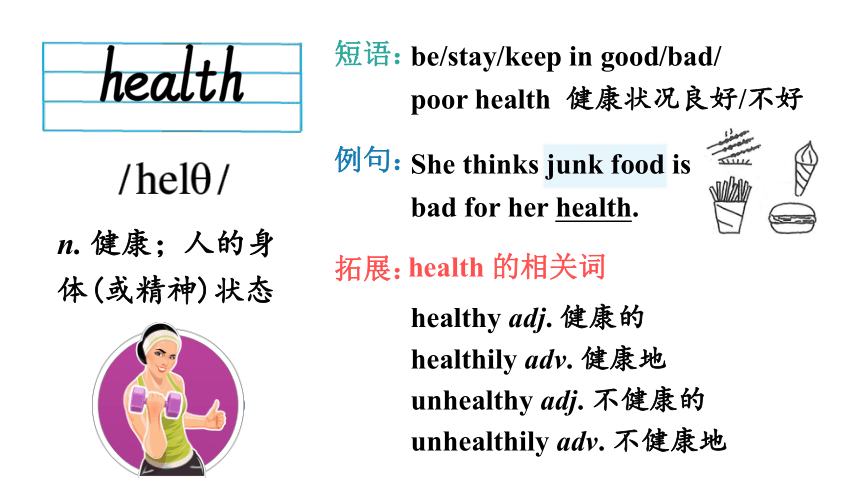
文档简介
(共55张PPT)
Unit2
How often do you exercise
词汇和语言知识点讲练
单元词汇讲解
n.家务劳动家务事
例句:
He is too lazy so he hardly does
housework.
拓展:含有-work的其他合成词
schoolwork 功课
homework 家庭作业
构成:
house(n. 房子)
+ work( n. 工作)
短语:
do (the) housework 做家务
adv. 几乎不;
几乎没有
拓展:hardly 与 hard
hardly adv. 意为“几乎不;几乎
没有”,表示否定意义
hard adv. 意为“努力地;猛烈地” adj. 意为“坚硬的;困难的;
艰苦的”
例句:
a) David can hardly speak Chinese.
b) Tom hardly eats breakfast, does he
hardly and water
adv. 一次;曾经
a) She goes to the
beach once a week.
b) I once met your mother.
例句:
拓展:once 构成的常见短语
once again 再一次
at once 立刻;马上
once in a while 有时;偶尔
adv. 两次;两倍
a) I go to the movies twice a week.
b) The ruler is twice as long as
that one.
例句:
短语:
twice a week 一周两次
think twice 再三考虑
拓展:
“一次”用once,“两次”用
twice,“三次及以上”用“基
数词+times”如:twice a day,
four times a year
n.(国际)互联网;因特网
短语:
surf the Internet 上网;网上冲浪on the Internet 在网上
a) John surfs the Internet once a day.
b) Mary likes shopping on the
Internet.
例句:
简写:Net
首字母通常大写,
且与定冠词the连用
Her life was too full.
Life is full of love everywhere.
例句:
adj. 忙的;满的;充满的;饱的
(1) 忙的 = busy,其反义词是 free
(2) 满的;充满的,反义词是 empty
(3) 饱的,反义词是 hungry
短语:
be full of… 充满……的;
装满……的
反义词:
过去式:swung
a) The children are playing on the
swings.
b) Jack’s arms swung as he walked.
例句:
n. 摆动;秋千
v. (使摆动);
摇摆
短语:
swing dance
摇摆舞
adv. 大概;
或许;可能
Maybe she went to
the mountains
with her friends.
例句:
辨析:maybe 与 may be
maybe:大概;或许;可能。副词,在句中
作状语,常用于句首
may be: 可能是,“情态动词may+动词原
形be”,在句中作谓语
Maybe he is at home.
=He may be at home.
maybe under the bed
a) It takes him at least an hour to do
the housework.
b) It’s the least I can do to help.
例句:
adv. 最小;最少
adj. & pron. 最小的;最少的
短语:
at least 至少;不少于;起码
反义短语: at most 至多;不超过
least money
n. 健康;人的身体(或精神)状态
例句:
She thinks junk food is
bad for her health.
拓展:
healthy adj. 健康的
healthily adv. 健康地
unhealthy adj. 不健康的
unhealthily adv. 不健康地
短语:
be/stay/keep in good/bad/
poor health 健康状况良好/不好
health 的相关词
n. 结果;后果
例句:
She was wet as a result of the heavy rain.
短语:
the result of… ……的结果
as a result 结果;因此
as a result of 因为;由于
拓展:
result v. 由……造成;因……发生
result in 导致;造成
n. 百分之……
a) Sixty percent of the boys in
our class like music.
例句:
“基数词+ percent of”结构中
percent 没有复数形式,该结构
作主语时,谓语动词的单复数
形式要与 of 后面的名词或代词
的数保持一致。
注意:
= per cent
b) Fifty percent of the drinking
water is from that village.
adj. & adv. 在线(的);联网(的)
a) Most of us go online for fun.
b) About sixty percent of the
students don’t like taking
online lessons in my class.
例句:
短语:
go online 去上网
在英语中,当表示“虽然……,
但是……”时,although 与 but
不能同时用于一个句子中。
conj. 虽然;
尽管;即使
Although the weather was bad,
we got to school on time.
=We got to school on time
although the weather was bad.
例句:
引导让步状语从句,放在主句前后均可,可与 though 互换。
注意:
Although he is old, He is strong.
a) I got the news through the Internet.
b) On sunny days, you can enjoy the
sunshine through the window.
例句:
prep. 以;凭借;穿过
辨析:through, over 与 across
through: 表示从某个空间内部“穿过”
over: 表示从某物的上方“越过”
across: 表示从某物的表面“横过;
穿过”,强调从一端到另一端
a) There are all kinds of thoughts
running through my mind.
b) Joe made up his mind to be a
writer after watching the program.
例句:
n. 头脑;心智
短语:
make up one’s mind 下决心
change one’s mind 改变某人的想法
in one’s mind 在某人看来;在某人心里keep… in mind 把……记在心里
adj. & pron. 这样的;那样的;类似的
There is no such thing as a free
lunch.
例句:
用法:
代指与上文或下文提到的人或事那样
such a/an+可数名词单数
such+可数名词复数/不可数名词
(2) 强调程度
such a/an+形容词+可数名词单数
如此……的一个……
such+形容词+可数名词复数/不可
数名词 如此……的……
Linda together with her parents does morning exercises every day.
例句:
adv. 在一起;共同
短语:
together with 和……一起
get together 聚在一起
注意:
连接两个主语时,谓语动词的数
与前一个主语保持一致。
His father died when he was
only 3.
例句:
v. 消失;灭亡;
死亡
过去式为died,现在分词为dying。
拓展:die 的相关词
dying adj. 临死的;垂死的
dead adj. 死的;失去生命的
death n. 死;死亡
It is raining hard. However, I still
want to visit my grandparents.
例句:
adv. 然而;不过
辨析:however 与 but
两者均表示转折或对比,其区别如下:however:adv. 然而;不过。比but正式,
可位于句首、句中或句末,需
要用逗号与其他成分隔开。
but:conj. 但是。常位于它所引出的句子
之首,其后一般不用逗号。
It’s raining.
However, I must go.
a) I almost forgot his name.
b) Ken was almost late for school.
例句:
adv. 几乎;差不多
注意:
almost 一般不与 not 连用,但
almost 可以与 no,none,nothing,never 等否定词连用。
一般位于实义动词之前,be动词、助动词或情态动词之后。
None of them eat junk food.
例句:
pron. 没有一个;毫无
(表示三者或三者以上的人或物的全部否定)
辨析:none, no one 与 nothing
none: 没有一个;毫无。既可指人,也可指物,通常与
of 连用。“none of +可数名词复数”作主语时,
谓语动词用单、复数皆可;“none of +不可数名
词”作主语时,谓语动词用单数形式。一般用来
回答 how many 或 how much 引导的特殊疑问句。
no one:没有人。只能指人。不与 of 短语连用。作主语
时,谓语动词只能用单数形式。用来回答 who
引导的特殊疑问句。
nothing:没有什么;没有一件东西。只能指物。不与 of
短语连用。作主语时,谓语动词只能用单数
形式。用来回答 what 引导的特殊疑问句。
a) We live here for less than two years.
b) I have less to worry about now.
例句:
adv. 较少;较小
adj. & pron.
较少的;更少的
作形容词时,less 是 little 的比较级形式,修饰不可数名词。
短语:
less than 少于
反义短语:more than 多于
a) He is three points behind Tim.
Eric pointed at the picture with
a pencil.
例句:
n. 得分;点
v. 指;指向
短语:
point at 指着(指近处)
point to 指向(指远处)
point out 指出
Section A 1a-3b知识点串讲
1. What do you usually do on weekends 你周末通常做什么? (课本第9页图片)
on weekends 意为“每逢周末;在周末”。
而on the weekend则表示“在周末;在这个周末”,特指在某个周末。
You should have a rest on weekends.你应该在周末休息一下。
Jack will visit his uncle on the weekend. 杰克这个周末将去看望他的叔叔。
【拓展】
on weekdays 意为“在工作日”。
I‘m busy on weekdays.May I see you on weekends 我工作日很忙,可以每逢周末与你见面吗?
2. help with housework 帮着做家务(课本第9页1a)
(1)help (sb.)with sth. 意为“帮助(某人)做某事”,相当于help (sb. to)do sth.。
Can you help me with my English =Can you help me (to)learn English 你可以帮我学英语吗?
(2)housework不可数名词,意为“家务劳动;家务事”。常用搭配为:do (the)housework “做家务”。
We should help our parents do (the) housework. 我们应该帮助父母做家务。
【拓展】
homework不可数名词,意为“家庭作业”,其常用搭配为:
do one’s homework。 “做家庭作业”。
3. sometimes 有时 (课本第9页1b)
sometimes 副词,意为“有时”,相当于at times。
I sometimes sleep late on weekends.=I sleep late at times on weekends. 周末我有时睡懒觉。
【辨析】sometimes,sometime,some times 与 some time
Sometimes it takes some time to do the research. 有时做这项研究要花费
一段时间。
sometimes 频度副词,“有时”,表示动作发生的不经常性,可位于句首,句中或句末,常用于一般现在时。
sometime 副词,“在某时”,表示某个不确切或不具体的时间,常用于过去时或将来时。
some times 名词短语,“几倍;几次”。
some time 名词短语,“一段时间”。
4. hardly ever 几乎从不(课本第9页1b)
hardly ever 意为“几乎从不”,ever 起强调作用。hardlyf副词,意为“几乎不;几乎没有”,表示否定意义。它通常位于系动词,助动词或情态动词之后,实义动词之前,常与can,could连用。
He is silent and hardly ever talks to others.他很沉默,几乎从不和别人说话。
The girl could hardly say a word at that time. 那个女孩当时几乎说不出话来。
【辨析】hardly与hard
hardly 副词,意为“几乎不;几乎没有”,常与ever,any等词连用。
hard 形容词,意为“困难的;硬的”。
副词,意为“努力地;猛烈地”。
5. —How often do you watch TV 你多久看一次电视?
—Twice a week. 每周两次。(课本第10页2a)
(1)how often 用来询问动作发生的频率,即动作多长时间发生一次,回答可以用once/twice/three times a day/sometimes/never等。
【辨析】how often, how long, how soon与how many times
(2)twice a week意为“每周两次”,其中twice为副词,意为“两次”。
Jill does housework twice a week. 吉尔每周做两次家务。
how often “多久一次”,指动作的频率。
how long “多长时间”,回答用for或since引导的时间状语。
how soon “还要多久......”,常用于将来时态,回答用in引导的时间状语。
how many times “多少次”,用于询问次数,回答用once,twice,three times等。
6. once a week 每周一次(课本第10页2a)
once a week 意为“每周一次”,其中once作副词,意为“一次”。类似表示次数的副词还有twice,若表示三次或三次以上,可用“基数词+times”。
Dave goes swimming once a week. 戴夫每周去游泳一次。
【拓展】
once还可表示“曾经”。
He once lived in Shanghai. 他曾经住在上海。
7. use the Internet 上网(课本第10页2c)
Internet 名词,意为”(国际)互联网;因特网“。常用短语:
surf the Internet “网上冲浪”;
on the Internet “在网上”。
You can find information on the Internet.
你可以在网上寻找信息。
8.Hi,Clare,are you free next week 嗨,克莱尔,你下周有空吗? (课本第10页2d)
free 形容词,意为“空闲的”。be free相当于have time。
Is Mr.Green free now =Does Mr.Green have time now 格林先生现在有空吗?
【拓展】
①free用作形容词,还表示“自由的;免费的”。
You are free to make your own decision. 你可以自由做决定。
This food is free. You don’t have to pay for it.这食物是免费的,你不必为它付款。
②freely是free的副词形式,意为“自由地;无拘无束地”。
The tourists went about London freely.游客们在伦敦四处自由游览。
9.Hmm... next week is quite full for me,Jack. 嗯......下周我很忙,杰克。(课本第10页2d)
full 形容词,在句中意为“忙的;有很多活动”。
Are you full these days 这些天你忙吗?
Her life was too full to find time for hobbies. 她的生活太忙,没有时间从事业余爱好。
【拓展】full的其他用法
①full意为“满的;充满的”,其反义词为empty“空的”。常用搭配“be full of”充满......。
The glass is full of milk. 这个玻璃杯里装满了牛奶。
②full意为“饱的”,其反义词为hungry,“饥饿的”。
I’m full now. 我现在吃饱了。
10.How come 怎么会呢?(课本第10页2d)
“How come ”是英语口语中的一个习语,相当于汉语”为什么?;怎么会?“等意思,即可独立使用,也可在其后接句子,用来询问事情的缘由或状况。
—I didn’t even eat lunch today.
我今天甚至没有吃午饭。
—Really How come
是吗?怎么会呢?
How come you eat so little?
你为什么吃的这么少?
11.I go to the movies maybe once a month. 我大概每月去看一次电影。(课本第11页Grammar Focus)
(1)go to the movies 意为“去看电影”,相当于go to the cinema。
We went to the movies last night. 昨晚我们去看电影了。
(2)maybe副词,意为“大概,或许,可能”,相当于perhaps,在句中做状语。
Maybe Mr.Miller will stay here for a week. 或许米勒先生将在这里待一周。
【辨析】 maybe 与 may be
Maybe you are right.=You may be right.也许你是对的。
maybe 副词,意为“大概,或许,可能”,在句中做状语,常用于句首。
may be “情态动词+be动词”结构,意为“可能是”,在句中做谓语,只用在句中。
12.How often do they stay up late 他们多久熬一次夜? (课本第11页3a)
stay up late 意为“深夜不睡;熬夜“。
It’s bad for us to stay up late. 熬夜对我们有害。
13.He plays at least twice a week. 他每周至少踢两次(足球)。(课本第11页3a)
(1)least 意为“最小的;最少的;最小”,是little的最高级。表示“最小的;最少的”时,其后接不可数名词。
He has the least money of us all. 在我们所有人当中他最没有钱。
(2)at least 意为“至少;不少于;起码”。
I think the old man is at least eighty years old. 我认为这个老人至少八十岁了。
【拓展】
at most 意为“至多;不超过”。
It will take two hours at most to get there. 最多花两个小时便
可到达那里。
Section B 2b Reading课文知识点串讲
What Do No. 5 High School Students Do in Their Free Time
Last month we asked our students about their free time activities. Our questions were about exercise, use of the Internet and watching TV. Here are the results.
We found that only fifteen percent of our students exercise every day. Forty-five percent exercise four to six times a week. Twenty percent exercise only one to three times a week. And twenty percent do not exercise at all!
上个月,我们询问了学生们的业余活动。我们的问题涉及锻炼、上网和看电视。下面是调查结果。我们发现,只有15%的学生每天锻炼,45%的学生每周锻炼四到六次,20%的学生每周仅锻炼一到三次,20%的学生根本就不锻炼!
We all know that many students often go online, but we were surprised that ninety percent of them use the Internet every day. The other ten percent use it at least three or four times a week. Most students use it for fun and not for homework.
The answers to our questions about watching television were also interesting. Only two percent of the students watch TV one to three times a week. Thirteen percent watch TV four to six times a week. And eighty-five percent watch TV every day! Although many students like
to watch sports, game shows are
the most popular.
我们都知道,许多学生经常上网,但令我们吃惊的是,他们当中90%的人每天都上网,其余10%的人每周至少上网三次或四次。大多数学生用它来娱乐而不是为了家庭作业。
对我们提出的有关看电视的问题的回答也颇有意思。只有2%的学生每周看一到三次电视,13%的学生每周看四到六次电视,85%的学生每天看电视!虽然许多学生喜欢观看体育节目,但游戏类节目却是最受欢迎的。
It is good to relax by using the Internet or watching game shows, but we think the best way to relax is through exercise. It is healthy for the mind and the body. Exercise such as playing sports is fun, and you can spend time with your friends and family as you play together. And remember, “old habits die hard”. So start exercising before it's too late!
通过上网或观看游戏类节目来放松是好的,但我们认为最好的放松方式是通过锻炼。它(锻炼)有利于身心健康。做运动之类的锻炼很有乐趣,并且当你与朋友和家人一起运动的时候,你们可以一起度过时光。记住:“旧习难改。”所以开始锻炼起来,不要等到来不及了!
1. Here are the results. 以下是结果。(课本第13页2b)
(1)本句是以here开头的完全倒装句。
★★★主语为the results,谓语为are。完全倒装句中谓语动词要放到主语之前。
Here comes my English teacher. 我的英语老师来了。
(2)result 名词,意为“结果;后果”。
常用短语为 the result(s) of,意为“......的结果”。
We are waiting for the result of the match. 我们在等比赛的结果。
2. We found that only fifteen percent of our students exercise every day. 我们发现只有15%的学生每天都锻炼。(课本第13页2b)
(1)本句为主从复合句,句子主干:We found +that从句。
find后除可接宾语从句外,还常接复合宾语,其用法如下:
★①find+宾语+名词
We found him an honest child. 我们发现他是一个诚实的孩子。
★②find+宾语+形容词
I found the bed very comfortable. 我发现这张床非常舒适。
★③find+宾语+动词-ing形式
The girl found her mother crying outside. 那个女孩发现她的
妈妈正在外面哭。
(2)percent名词,意为“百分之...”。
数词加percent构成百分数,其中,percent无复数形式,与名词连用时,后面需要加of。
Forty percent of the girls said their fathers hardly talked with them. 40%的女孩说她们的父亲几乎不与她们谈话。
【拓展】
“数词+percent of+名词”做主语时,谓语动词的数要与of后面的名词的单复数保持一致。
Sixty percent of the boys in our class like music. 我们班60%的男生喜欢音乐。
Fifteen percent of the water is polluted. 15%的水被污染了。
3. And tewnty percent do not exercise at all. 还有20%的学生一点儿也不锻炼。(课本第13页2b)
not (...) at all 意为“一点儿也不(......);根本不(......)”。
I don’t know about it at all. 对它我一点儿也不知道。
——Do you like the film 你喜欢这部电影吗?
——Not at all. It is too boring. 一点儿也不喜欢。它太无聊了。
【拓展】
“not at all”还意为”不客气“,相当于”you are welcome”。
——Thank you for your help. 谢谢你的帮助。
——Not at all. 不客气。
4. Although may students like to watch sports,game show are the most popular. 虽然许多学生喜欢观看体育节目,但游戏类节目却是最受欢迎的。(课本第13页2b)
although 连词,意为“虽然;尽管;即使”,引导让步状语从句,相当于though,两者在大多数情况下可以通用。
Although /Though we are poor,we are still happy. 我们虽然穷,但仍然很快乐。
【注意】
①although/though与but不可用于同一个句子中。 ②although引导的从句,即可谓语主句之前,也可位于主句之
后。若置于主句之前,多用逗号与主句隔开。
5. ...but we think the best way to relax is through exercise. ......但是我们认为最好的放松方式是通过锻炼。(课本第13页2b)
through 介词,意为“穿过;凭借;以”。
You can only achieve success through hard work. 你只有通过努力工作才能成功。
The train passed through the tunnel very quickly. 火车飞快地穿过了隧道。
【辨析】 through 与 across
through 通过;穿过 表示动作是在某一空间内进行的,强调从内部穿过
across 横过;穿过 表示动作是在某一物体的表面进行的,强调从一边到另一边
6. Exercise such as playing sports is fun,and you can spend time with your friends and family as you play together. 像进行体育运动这样的锻炼是有趣的,当你和朋友、家人一起运动的时候,你可以和他们共度时光。(课本第13页2b)
(1)such as 意为“例如;像...这样“,相当于like,用于举例。
I know many of them,such as John and Kate. 我认识他们当中的很多人,例如约翰和凯特。
(2)spend time with... 意为“和...一起度过/消磨时间”。
I often spend time with my best friend. 我经常和最好的朋友
共度时光。
【辨析】spend, cost, play 与 take
单词 主语 常用搭配
spend 人 ①sb. spend+时间/金钱+on sth.
②sb. spend+时间/金钱+doing sth.
cost 物 sth. cost (sb.) +金钱
pay 人 ①sb. pay for sth.
②sb. pay+金钱+for sth.
take it It takes sb.+时间+to do sth.
I spent 1000 yuan on the computer. =The computer cost me 1000 yuan .= I paid 1000 yuan for the computer.
我买这台电脑花了1000元。
It took me an hour to write the letter.
我花了一个小时写这封信。
(3)together 副词,意为“在一起;共同”。
常用搭配为 together with, 意为“和...一起”。
We will spend the difficult time together.
我们将一起度过困难时刻。
Mary,together with her mother,often goes to the movies.
玛丽和她妈妈经常去看电影。
7. And remember,”Old habits die hard.” 还有,记住,“旧习难改”。(课本第13页2b)
(1)old habits die hard 是英语中的一句谚语,用来说明习惯一旦养成,并非朝夕可以改变,其中die hard 表示“(旧习惯、传统等)难以改变;根深蒂固”。
(2)die 非延续性动词,意为“消失;灭亡;死亡”,不能和时间段连用,过去式为died,现在分词为dying,dying还可用作形容词,意为“垂死的;临终的”。
【拓展】
①dead是die的形容词形式,意为“死的”。
②death是die的名词形式,意为“死;死亡”。
8. Jane is a 16-year-old high school student in the United States. 简是一名十六岁的美国高中生。
16-year-old 意为“十六岁的”,它是由“数词+名词+形容词”构成的复合形容词,中间用连字符连接,其中名词要用单数形式。
Lucy,an eight-year-old girl,won the prize.
八岁女孩露西获得了这个奖项。
This is a ten-meter-long ladder.
这是一架十米长的梯子。
Unit2
How often do you exercise
词汇和语言知识点讲练
单元词汇讲解
n.家务劳动家务事
例句:
He is too lazy so he hardly does
housework.
拓展:含有-work的其他合成词
schoolwork 功课
homework 家庭作业
构成:
house(n. 房子)
+ work( n. 工作)
短语:
do (the) housework 做家务
adv. 几乎不;
几乎没有
拓展:hardly 与 hard
hardly adv. 意为“几乎不;几乎
没有”,表示否定意义
hard adv. 意为“努力地;猛烈地” adj. 意为“坚硬的;困难的;
艰苦的”
例句:
a) David can hardly speak Chinese.
b) Tom hardly eats breakfast, does he
hardly and water
adv. 一次;曾经
a) She goes to the
beach once a week.
b) I once met your mother.
例句:
拓展:once 构成的常见短语
once again 再一次
at once 立刻;马上
once in a while 有时;偶尔
adv. 两次;两倍
a) I go to the movies twice a week.
b) The ruler is twice as long as
that one.
例句:
短语:
twice a week 一周两次
think twice 再三考虑
拓展:
“一次”用once,“两次”用
twice,“三次及以上”用“基
数词+times”如:twice a day,
four times a year
n.(国际)互联网;因特网
短语:
surf the Internet 上网;网上冲浪on the Internet 在网上
a) John surfs the Internet once a day.
b) Mary likes shopping on the
Internet.
例句:
简写:Net
首字母通常大写,
且与定冠词the连用
Her life was too full.
Life is full of love everywhere.
例句:
adj. 忙的;满的;充满的;饱的
(1) 忙的 = busy,其反义词是 free
(2) 满的;充满的,反义词是 empty
(3) 饱的,反义词是 hungry
短语:
be full of… 充满……的;
装满……的
反义词:
过去式:swung
a) The children are playing on the
swings.
b) Jack’s arms swung as he walked.
例句:
n. 摆动;秋千
v. (使摆动);
摇摆
短语:
swing dance
摇摆舞
adv. 大概;
或许;可能
Maybe she went to
the mountains
with her friends.
例句:
辨析:maybe 与 may be
maybe:大概;或许;可能。副词,在句中
作状语,常用于句首
may be: 可能是,“情态动词may+动词原
形be”,在句中作谓语
Maybe he is at home.
=He may be at home.
maybe under the bed
a) It takes him at least an hour to do
the housework.
b) It’s the least I can do to help.
例句:
adv. 最小;最少
adj. & pron. 最小的;最少的
短语:
at least 至少;不少于;起码
反义短语: at most 至多;不超过
least money
n. 健康;人的身体(或精神)状态
例句:
She thinks junk food is
bad for her health.
拓展:
healthy adj. 健康的
healthily adv. 健康地
unhealthy adj. 不健康的
unhealthily adv. 不健康地
短语:
be/stay/keep in good/bad/
poor health 健康状况良好/不好
health 的相关词
n. 结果;后果
例句:
She was wet as a result of the heavy rain.
短语:
the result of… ……的结果
as a result 结果;因此
as a result of 因为;由于
拓展:
result v. 由……造成;因……发生
result in 导致;造成
n. 百分之……
a) Sixty percent of the boys in
our class like music.
例句:
“基数词+ percent of”结构中
percent 没有复数形式,该结构
作主语时,谓语动词的单复数
形式要与 of 后面的名词或代词
的数保持一致。
注意:
= per cent
b) Fifty percent of the drinking
water is from that village.
adj. & adv. 在线(的);联网(的)
a) Most of us go online for fun.
b) About sixty percent of the
students don’t like taking
online lessons in my class.
例句:
短语:
go online 去上网
在英语中,当表示“虽然……,
但是……”时,although 与 but
不能同时用于一个句子中。
conj. 虽然;
尽管;即使
Although the weather was bad,
we got to school on time.
=We got to school on time
although the weather was bad.
例句:
引导让步状语从句,放在主句前后均可,可与 though 互换。
注意:
Although he is old, He is strong.
a) I got the news through the Internet.
b) On sunny days, you can enjoy the
sunshine through the window.
例句:
prep. 以;凭借;穿过
辨析:through, over 与 across
through: 表示从某个空间内部“穿过”
over: 表示从某物的上方“越过”
across: 表示从某物的表面“横过;
穿过”,强调从一端到另一端
a) There are all kinds of thoughts
running through my mind.
b) Joe made up his mind to be a
writer after watching the program.
例句:
n. 头脑;心智
短语:
make up one’s mind 下决心
change one’s mind 改变某人的想法
in one’s mind 在某人看来;在某人心里keep… in mind 把……记在心里
adj. & pron. 这样的;那样的;类似的
There is no such thing as a free
lunch.
例句:
用法:
代指与上文或下文提到的人或事那样
such a/an+可数名词单数
such+可数名词复数/不可数名词
(2) 强调程度
such a/an+形容词+可数名词单数
如此……的一个……
such+形容词+可数名词复数/不可
数名词 如此……的……
Linda together with her parents does morning exercises every day.
例句:
adv. 在一起;共同
短语:
together with 和……一起
get together 聚在一起
注意:
连接两个主语时,谓语动词的数
与前一个主语保持一致。
His father died when he was
only 3.
例句:
v. 消失;灭亡;
死亡
过去式为died,现在分词为dying。
拓展:die 的相关词
dying adj. 临死的;垂死的
dead adj. 死的;失去生命的
death n. 死;死亡
It is raining hard. However, I still
want to visit my grandparents.
例句:
adv. 然而;不过
辨析:however 与 but
两者均表示转折或对比,其区别如下:however:adv. 然而;不过。比but正式,
可位于句首、句中或句末,需
要用逗号与其他成分隔开。
but:conj. 但是。常位于它所引出的句子
之首,其后一般不用逗号。
It’s raining.
However, I must go.
a) I almost forgot his name.
b) Ken was almost late for school.
例句:
adv. 几乎;差不多
注意:
almost 一般不与 not 连用,但
almost 可以与 no,none,nothing,never 等否定词连用。
一般位于实义动词之前,be动词、助动词或情态动词之后。
None of them eat junk food.
例句:
pron. 没有一个;毫无
(表示三者或三者以上的人或物的全部否定)
辨析:none, no one 与 nothing
none: 没有一个;毫无。既可指人,也可指物,通常与
of 连用。“none of +可数名词复数”作主语时,
谓语动词用单、复数皆可;“none of +不可数名
词”作主语时,谓语动词用单数形式。一般用来
回答 how many 或 how much 引导的特殊疑问句。
no one:没有人。只能指人。不与 of 短语连用。作主语
时,谓语动词只能用单数形式。用来回答 who
引导的特殊疑问句。
nothing:没有什么;没有一件东西。只能指物。不与 of
短语连用。作主语时,谓语动词只能用单数
形式。用来回答 what 引导的特殊疑问句。
a) We live here for less than two years.
b) I have less to worry about now.
例句:
adv. 较少;较小
adj. & pron.
较少的;更少的
作形容词时,less 是 little 的比较级形式,修饰不可数名词。
短语:
less than 少于
反义短语:more than 多于
a) He is three points behind Tim.
Eric pointed at the picture with
a pencil.
例句:
n. 得分;点
v. 指;指向
短语:
point at 指着(指近处)
point to 指向(指远处)
point out 指出
Section A 1a-3b知识点串讲
1. What do you usually do on weekends 你周末通常做什么? (课本第9页图片)
on weekends 意为“每逢周末;在周末”。
而on the weekend则表示“在周末;在这个周末”,特指在某个周末。
You should have a rest on weekends.你应该在周末休息一下。
Jack will visit his uncle on the weekend. 杰克这个周末将去看望他的叔叔。
【拓展】
on weekdays 意为“在工作日”。
I‘m busy on weekdays.May I see you on weekends 我工作日很忙,可以每逢周末与你见面吗?
2. help with housework 帮着做家务(课本第9页1a)
(1)help (sb.)with sth. 意为“帮助(某人)做某事”,相当于help (sb. to)do sth.。
Can you help me with my English =Can you help me (to)learn English 你可以帮我学英语吗?
(2)housework不可数名词,意为“家务劳动;家务事”。常用搭配为:do (the)housework “做家务”。
We should help our parents do (the) housework. 我们应该帮助父母做家务。
【拓展】
homework不可数名词,意为“家庭作业”,其常用搭配为:
do one’s homework。 “做家庭作业”。
3. sometimes 有时 (课本第9页1b)
sometimes 副词,意为“有时”,相当于at times。
I sometimes sleep late on weekends.=I sleep late at times on weekends. 周末我有时睡懒觉。
【辨析】sometimes,sometime,some times 与 some time
Sometimes it takes some time to do the research. 有时做这项研究要花费
一段时间。
sometimes 频度副词,“有时”,表示动作发生的不经常性,可位于句首,句中或句末,常用于一般现在时。
sometime 副词,“在某时”,表示某个不确切或不具体的时间,常用于过去时或将来时。
some times 名词短语,“几倍;几次”。
some time 名词短语,“一段时间”。
4. hardly ever 几乎从不(课本第9页1b)
hardly ever 意为“几乎从不”,ever 起强调作用。hardlyf副词,意为“几乎不;几乎没有”,表示否定意义。它通常位于系动词,助动词或情态动词之后,实义动词之前,常与can,could连用。
He is silent and hardly ever talks to others.他很沉默,几乎从不和别人说话。
The girl could hardly say a word at that time. 那个女孩当时几乎说不出话来。
【辨析】hardly与hard
hardly 副词,意为“几乎不;几乎没有”,常与ever,any等词连用。
hard 形容词,意为“困难的;硬的”。
副词,意为“努力地;猛烈地”。
5. —How often do you watch TV 你多久看一次电视?
—Twice a week. 每周两次。(课本第10页2a)
(1)how often 用来询问动作发生的频率,即动作多长时间发生一次,回答可以用once/twice/three times a day/sometimes/never等。
【辨析】how often, how long, how soon与how many times
(2)twice a week意为“每周两次”,其中twice为副词,意为“两次”。
Jill does housework twice a week. 吉尔每周做两次家务。
how often “多久一次”,指动作的频率。
how long “多长时间”,回答用for或since引导的时间状语。
how soon “还要多久......”,常用于将来时态,回答用in引导的时间状语。
how many times “多少次”,用于询问次数,回答用once,twice,three times等。
6. once a week 每周一次(课本第10页2a)
once a week 意为“每周一次”,其中once作副词,意为“一次”。类似表示次数的副词还有twice,若表示三次或三次以上,可用“基数词+times”。
Dave goes swimming once a week. 戴夫每周去游泳一次。
【拓展】
once还可表示“曾经”。
He once lived in Shanghai. 他曾经住在上海。
7. use the Internet 上网(课本第10页2c)
Internet 名词,意为”(国际)互联网;因特网“。常用短语:
surf the Internet “网上冲浪”;
on the Internet “在网上”。
You can find information on the Internet.
你可以在网上寻找信息。
8.Hi,Clare,are you free next week 嗨,克莱尔,你下周有空吗? (课本第10页2d)
free 形容词,意为“空闲的”。be free相当于have time。
Is Mr.Green free now =Does Mr.Green have time now 格林先生现在有空吗?
【拓展】
①free用作形容词,还表示“自由的;免费的”。
You are free to make your own decision. 你可以自由做决定。
This food is free. You don’t have to pay for it.这食物是免费的,你不必为它付款。
②freely是free的副词形式,意为“自由地;无拘无束地”。
The tourists went about London freely.游客们在伦敦四处自由游览。
9.Hmm... next week is quite full for me,Jack. 嗯......下周我很忙,杰克。(课本第10页2d)
full 形容词,在句中意为“忙的;有很多活动”。
Are you full these days 这些天你忙吗?
Her life was too full to find time for hobbies. 她的生活太忙,没有时间从事业余爱好。
【拓展】full的其他用法
①full意为“满的;充满的”,其反义词为empty“空的”。常用搭配“be full of”充满......。
The glass is full of milk. 这个玻璃杯里装满了牛奶。
②full意为“饱的”,其反义词为hungry,“饥饿的”。
I’m full now. 我现在吃饱了。
10.How come 怎么会呢?(课本第10页2d)
“How come ”是英语口语中的一个习语,相当于汉语”为什么?;怎么会?“等意思,即可独立使用,也可在其后接句子,用来询问事情的缘由或状况。
—I didn’t even eat lunch today.
我今天甚至没有吃午饭。
—Really How come
是吗?怎么会呢?
How come you eat so little?
你为什么吃的这么少?
11.I go to the movies maybe once a month. 我大概每月去看一次电影。(课本第11页Grammar Focus)
(1)go to the movies 意为“去看电影”,相当于go to the cinema。
We went to the movies last night. 昨晚我们去看电影了。
(2)maybe副词,意为“大概,或许,可能”,相当于perhaps,在句中做状语。
Maybe Mr.Miller will stay here for a week. 或许米勒先生将在这里待一周。
【辨析】 maybe 与 may be
Maybe you are right.=You may be right.也许你是对的。
maybe 副词,意为“大概,或许,可能”,在句中做状语,常用于句首。
may be “情态动词+be动词”结构,意为“可能是”,在句中做谓语,只用在句中。
12.How often do they stay up late 他们多久熬一次夜? (课本第11页3a)
stay up late 意为“深夜不睡;熬夜“。
It’s bad for us to stay up late. 熬夜对我们有害。
13.He plays at least twice a week. 他每周至少踢两次(足球)。(课本第11页3a)
(1)least 意为“最小的;最少的;最小”,是little的最高级。表示“最小的;最少的”时,其后接不可数名词。
He has the least money of us all. 在我们所有人当中他最没有钱。
(2)at least 意为“至少;不少于;起码”。
I think the old man is at least eighty years old. 我认为这个老人至少八十岁了。
【拓展】
at most 意为“至多;不超过”。
It will take two hours at most to get there. 最多花两个小时便
可到达那里。
Section B 2b Reading课文知识点串讲
What Do No. 5 High School Students Do in Their Free Time
Last month we asked our students about their free time activities. Our questions were about exercise, use of the Internet and watching TV. Here are the results.
We found that only fifteen percent of our students exercise every day. Forty-five percent exercise four to six times a week. Twenty percent exercise only one to three times a week. And twenty percent do not exercise at all!
上个月,我们询问了学生们的业余活动。我们的问题涉及锻炼、上网和看电视。下面是调查结果。我们发现,只有15%的学生每天锻炼,45%的学生每周锻炼四到六次,20%的学生每周仅锻炼一到三次,20%的学生根本就不锻炼!
We all know that many students often go online, but we were surprised that ninety percent of them use the Internet every day. The other ten percent use it at least three or four times a week. Most students use it for fun and not for homework.
The answers to our questions about watching television were also interesting. Only two percent of the students watch TV one to three times a week. Thirteen percent watch TV four to six times a week. And eighty-five percent watch TV every day! Although many students like
to watch sports, game shows are
the most popular.
我们都知道,许多学生经常上网,但令我们吃惊的是,他们当中90%的人每天都上网,其余10%的人每周至少上网三次或四次。大多数学生用它来娱乐而不是为了家庭作业。
对我们提出的有关看电视的问题的回答也颇有意思。只有2%的学生每周看一到三次电视,13%的学生每周看四到六次电视,85%的学生每天看电视!虽然许多学生喜欢观看体育节目,但游戏类节目却是最受欢迎的。
It is good to relax by using the Internet or watching game shows, but we think the best way to relax is through exercise. It is healthy for the mind and the body. Exercise such as playing sports is fun, and you can spend time with your friends and family as you play together. And remember, “old habits die hard”. So start exercising before it's too late!
通过上网或观看游戏类节目来放松是好的,但我们认为最好的放松方式是通过锻炼。它(锻炼)有利于身心健康。做运动之类的锻炼很有乐趣,并且当你与朋友和家人一起运动的时候,你们可以一起度过时光。记住:“旧习难改。”所以开始锻炼起来,不要等到来不及了!
1. Here are the results. 以下是结果。(课本第13页2b)
(1)本句是以here开头的完全倒装句。
★★★主语为the results,谓语为are。完全倒装句中谓语动词要放到主语之前。
Here comes my English teacher. 我的英语老师来了。
(2)result 名词,意为“结果;后果”。
常用短语为 the result(s) of,意为“......的结果”。
We are waiting for the result of the match. 我们在等比赛的结果。
2. We found that only fifteen percent of our students exercise every day. 我们发现只有15%的学生每天都锻炼。(课本第13页2b)
(1)本句为主从复合句,句子主干:We found +that从句。
find后除可接宾语从句外,还常接复合宾语,其用法如下:
★①find+宾语+名词
We found him an honest child. 我们发现他是一个诚实的孩子。
★②find+宾语+形容词
I found the bed very comfortable. 我发现这张床非常舒适。
★③find+宾语+动词-ing形式
The girl found her mother crying outside. 那个女孩发现她的
妈妈正在外面哭。
(2)percent名词,意为“百分之...”。
数词加percent构成百分数,其中,percent无复数形式,与名词连用时,后面需要加of。
Forty percent of the girls said their fathers hardly talked with them. 40%的女孩说她们的父亲几乎不与她们谈话。
【拓展】
“数词+percent of+名词”做主语时,谓语动词的数要与of后面的名词的单复数保持一致。
Sixty percent of the boys in our class like music. 我们班60%的男生喜欢音乐。
Fifteen percent of the water is polluted. 15%的水被污染了。
3. And tewnty percent do not exercise at all. 还有20%的学生一点儿也不锻炼。(课本第13页2b)
not (...) at all 意为“一点儿也不(......);根本不(......)”。
I don’t know about it at all. 对它我一点儿也不知道。
——Do you like the film 你喜欢这部电影吗?
——Not at all. It is too boring. 一点儿也不喜欢。它太无聊了。
【拓展】
“not at all”还意为”不客气“,相当于”you are welcome”。
——Thank you for your help. 谢谢你的帮助。
——Not at all. 不客气。
4. Although may students like to watch sports,game show are the most popular. 虽然许多学生喜欢观看体育节目,但游戏类节目却是最受欢迎的。(课本第13页2b)
although 连词,意为“虽然;尽管;即使”,引导让步状语从句,相当于though,两者在大多数情况下可以通用。
Although /Though we are poor,we are still happy. 我们虽然穷,但仍然很快乐。
【注意】
①although/though与but不可用于同一个句子中。 ②although引导的从句,即可谓语主句之前,也可位于主句之
后。若置于主句之前,多用逗号与主句隔开。
5. ...but we think the best way to relax is through exercise. ......但是我们认为最好的放松方式是通过锻炼。(课本第13页2b)
through 介词,意为“穿过;凭借;以”。
You can only achieve success through hard work. 你只有通过努力工作才能成功。
The train passed through the tunnel very quickly. 火车飞快地穿过了隧道。
【辨析】 through 与 across
through 通过;穿过 表示动作是在某一空间内进行的,强调从内部穿过
across 横过;穿过 表示动作是在某一物体的表面进行的,强调从一边到另一边
6. Exercise such as playing sports is fun,and you can spend time with your friends and family as you play together. 像进行体育运动这样的锻炼是有趣的,当你和朋友、家人一起运动的时候,你可以和他们共度时光。(课本第13页2b)
(1)such as 意为“例如;像...这样“,相当于like,用于举例。
I know many of them,such as John and Kate. 我认识他们当中的很多人,例如约翰和凯特。
(2)spend time with... 意为“和...一起度过/消磨时间”。
I often spend time with my best friend. 我经常和最好的朋友
共度时光。
【辨析】spend, cost, play 与 take
单词 主语 常用搭配
spend 人 ①sb. spend+时间/金钱+on sth.
②sb. spend+时间/金钱+doing sth.
cost 物 sth. cost (sb.) +金钱
pay 人 ①sb. pay for sth.
②sb. pay+金钱+for sth.
take it It takes sb.+时间+to do sth.
I spent 1000 yuan on the computer. =The computer cost me 1000 yuan .= I paid 1000 yuan for the computer.
我买这台电脑花了1000元。
It took me an hour to write the letter.
我花了一个小时写这封信。
(3)together 副词,意为“在一起;共同”。
常用搭配为 together with, 意为“和...一起”。
We will spend the difficult time together.
我们将一起度过困难时刻。
Mary,together with her mother,often goes to the movies.
玛丽和她妈妈经常去看电影。
7. And remember,”Old habits die hard.” 还有,记住,“旧习难改”。(课本第13页2b)
(1)old habits die hard 是英语中的一句谚语,用来说明习惯一旦养成,并非朝夕可以改变,其中die hard 表示“(旧习惯、传统等)难以改变;根深蒂固”。
(2)die 非延续性动词,意为“消失;灭亡;死亡”,不能和时间段连用,过去式为died,现在分词为dying,dying还可用作形容词,意为“垂死的;临终的”。
【拓展】
①dead是die的形容词形式,意为“死的”。
②death是die的名词形式,意为“死;死亡”。
8. Jane is a 16-year-old high school student in the United States. 简是一名十六岁的美国高中生。
16-year-old 意为“十六岁的”,它是由“数词+名词+形容词”构成的复合形容词,中间用连字符连接,其中名词要用单数形式。
Lucy,an eight-year-old girl,won the prize.
八岁女孩露西获得了这个奖项。
This is a ten-meter-long ladder.
这是一架十米长的梯子。
同课章节目录
- Unit 1 Where did you go on vacation?
- Section A
- Section B
- Unit 2 How often do you exercise?
- Section A
- Section B
- Unit 3 I'm more outgoing than my sister.
- Section A
- Section B
- Unit 4 What's the best movie theater?
- Section A
- Section B
- Unit 5 Do you want to watch a game show?
- Section A
- Section B
- Unit 6 I'm going to study computer science.
- Section A
- Section B
- Unit 7 Will people have robots?
- Section A
- Section B
- Unit 8 How do you make a banana milk shake?
- Section A
- Section B
- Unit 9 Can you come to my party?
- Section A
- Section B
- Unit 10 If you go to the party, you'll have a grea
- Section A
- Section B
